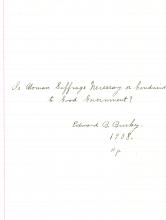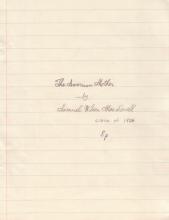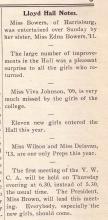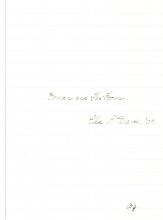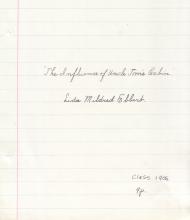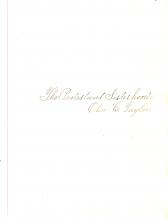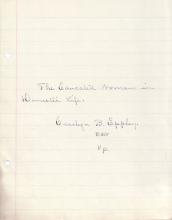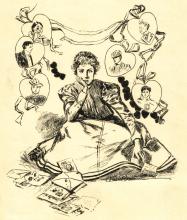Samuel W. MacDowell's Essay "American Motherhood"
In his essay "American Motherhood," Samuel W. MacDowell argued that motherhood is one of the most important position a woman can hold. He contended that it was through motherhood, not the vote, that women were able to assert their influence within American society. He referenced Washington's, Adams', Lincoln's and McKinley's mothers to illustrate his point.
"Rules and Regulations for Underclassmen."
An excerpt from The Dickinsonian's article titled "Rules and Regulations for Underclassmen." The rules were created by a committee of upperclassmen and underclassmen are required to follow them. This section contains those rules which apply specifically to women during the 1907 school year.
Ella P. Davis's Essay "Woman and the Home"
In her essay "Woman and the Home," Ella P. Davis discussed the ways in which society limited women's opportunities based on their gender. She wrote, "In a country where public life is capable of so much further development, and where civil and political funcations, which in other lands have come to be regarded as the rights of common citizen, are so grudgingly bestowed upon men of even the lightest intelligence, it is no wonder that the position of women is not an ideal one." Throughout her essay, Davis cites the German women's movement's influence on women's education.
Lida Mildred Ebbert's 1908 Essay "The Influence of Uncle Tom's Cabin"
In her essay titled "The Influence of Uncle Tom's Cabin," Lida Mildred Ebbert explored the great importance of the novel upon nineteenth- and twentieth-century Americans. She argued that "It is probable that no other book, except the Bible, has had such world-wide popularity and impact." Ebbert went on to discuss the author, Harriet Beecher Stowe, and the time in which the book was written.
Olive C. Taylor's Senior Oration "The Prostestant Sisterhood," 1900
In her senior oration "The Protestant Sisterhood," Olive Taylor discussed the centrality of women in religious communities throughout history. She argues that women's activity as reformers and missionaries within the church in the late nineteenth and early twentieth centuries was unprecedented. For the first time, she asserted, protestant women were leaving the private sphere and working independently within the public sphere. However, Olive argued, women were still being the motherly figures they were born to be.
"Should Women Vote?" by H. M. Showalter, class of 1904
In his essay "Should Women Vote?", H. M. Showalter argues for women's suffrage in 1904. He acknowledges that women are not given the right to vote because they are often the dependents of men like "minors and paupers." Due to their dependence, their vote could be swayed. However, Showalter does not see this as a legitimate reason for denying women the vote. He lists six premises for his conclusion. They are:
1. God created man and woman equal.
2. The Constitution gives equal rights to all.
Carolyn Baer Eppley's Essay "The Educated Woman in Domestic Life"
In her essay "The Educated Woman in Domestic Life," Carolyn Baer Eppley argued that women must be college educated so as to better fulfill their roles as wives, mothers, and citizens. She contended that women need to be educated in order to better instruct their children, encourage their husband's thinking, contribute to society, and maintain strong relationships with their spouses.

